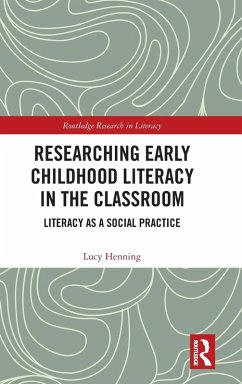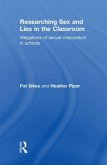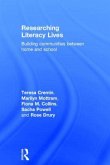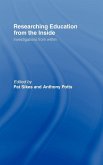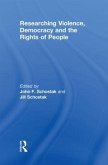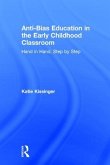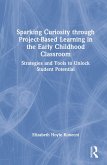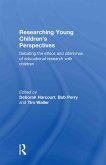- Gebundenes Buch
- Merkliste
- Auf die Merkliste
- Bewerten Bewerten
- Teilen
- Produkt teilen
- Produkterinnerung
- Produkterinnerung
This volume demonstrates how the ethnographic approach to research demanded by a 'Literacy as Social Practice' perspective can generate fresh insights into what happens when young children engage with schooled literacy tasks.
Andere Kunden interessierten sich auch für
![Researching Sex and Lies in the Classroom Researching Sex and Lies in the Classroom]() Pat SikesResearching Sex and Lies in the Classroom149,99 €
Pat SikesResearching Sex and Lies in the Classroom149,99 €![Researching Literacy Lives Researching Literacy Lives]() Teresa CreminResearching Literacy Lives195,99 €
Teresa CreminResearching Literacy Lives195,99 €![Researching Education from the Inside Researching Education from the Inside]() Anthony Potts / Pat Sikes (eds.)Researching Education from the Inside177,99 €
Anthony Potts / Pat Sikes (eds.)Researching Education from the Inside177,99 €![Researching Violence, Democracy and the Rights of People Researching Violence, Democracy and the Rights of People]() Researching Violence, Democracy and the Rights of People177,99 €
Researching Violence, Democracy and the Rights of People177,99 €![Anti-Bias Education in the Early Childhood Classroom Anti-Bias Education in the Early Childhood Classroom]() Katie KissingerAnti-Bias Education in the Early Childhood Classroom130,99 €
Katie KissingerAnti-Bias Education in the Early Childhood Classroom130,99 €![Sparking Curiosity through Project-Based Learning in the Early Childhood Classroom Sparking Curiosity through Project-Based Learning in the Early Childhood Classroom]() Elizabeth Hoyle KonecniSparking Curiosity through Project-Based Learning in the Early Childhood Classroom152,99 €
Elizabeth Hoyle KonecniSparking Curiosity through Project-Based Learning in the Early Childhood Classroom152,99 €![Researching Young Children's Perspectives Researching Young Children's Perspectives]() Researching Young Children's Perspectives203,99 €
Researching Young Children's Perspectives203,99 €-
-
-
This volume demonstrates how the ethnographic approach to research demanded by a 'Literacy as Social Practice' perspective can generate fresh insights into what happens when young children engage with schooled literacy tasks.
Produktdetails
- Produktdetails
- Verlag: Routledge
- Seitenzahl: 200
- Erscheinungstermin: 24. Oktober 2019
- Englisch
- Abmessung: 235mm x 157mm x 15mm
- Gewicht: 448g
- ISBN-13: 9781138597228
- ISBN-10: 1138597228
- Artikelnr.: 58052856
- Herstellerkennzeichnung
- Libri GmbH
- Europaallee 1
- 36244 Bad Hersfeld
- gpsr@libri.de
- Verlag: Routledge
- Seitenzahl: 200
- Erscheinungstermin: 24. Oktober 2019
- Englisch
- Abmessung: 235mm x 157mm x 15mm
- Gewicht: 448g
- ISBN-13: 9781138597228
- ISBN-10: 1138597228
- Artikelnr.: 58052856
- Herstellerkennzeichnung
- Libri GmbH
- Europaallee 1
- 36244 Bad Hersfeld
- gpsr@libri.de
Lucy Henning is Senior Lecturer in primary English at Roehampton University, UK.
List of Abbreviations
List of transcription conventions
Foreword
ACKNOWLEDGEMENTS
Introduction: Literacy, Schooling and Young Children
PART ONE: FRESH PERSPECTIVES ON FAMILIAR PHENOMENA
Chapter 1 Fresh Perspectives on Familiar Phenomena
* Introduction
* Section 1: Literacy in the social world
* Section 2: Literacy in the institution of schooling
* Section 3: Children's interpretive reproduction of literacy in
schools
* Conclusion
Chapter 2: Researching Young Children's in-school literacy practices
Introduction
* Section 1: Policy priorities for researching early childhood literacy
* Section 2: Ethnographic principles for researching early childhood
literacy in classrooms
* Section 3: Re-examining young children's in-school literacy practices
* Conclusion
PART TWO: AMBER CLASS CHILDREN PRACTISE LITERACY
Chapter 3: Jessica practises literacy with Donna
* Introduction
* Section 1: Normalising expectations for young children's literacy
practices.
* Section 2: Interpretively reproducing literacy practices in the
classroom.
* Section 3: Interpretively Reproducing literacy skills and knowledge
* Conclusion
Chapter 4: The importance of Amber Class' children's in-class peer culture
* Introduction
* Section 1: Producing peer culture literacy in social interaction
* Section 2: Managing peer culture priorities: Peer to peer copying
* Section 3: Managing peer culture and schooled literacy priorities
* Conclusion
Chapter 5 Amber Class Children's encounter with being grouped for teaching
* Introduction
* Section 1: Schooled literacy manages relative literacy expertise
* Section 2: Peer culture interpretations of schooled groupings
* Section 3: Sharing literacy expertise in the peer culture
* Conclusion
PART THREE: DISCUSSION AND CONCLUSIONS
Discussion: Reflecting on young children, schooling and literacy
Conclusion
Appendix: My research project
REFERENCES
List of transcription conventions
Foreword
ACKNOWLEDGEMENTS
Introduction: Literacy, Schooling and Young Children
PART ONE: FRESH PERSPECTIVES ON FAMILIAR PHENOMENA
Chapter 1 Fresh Perspectives on Familiar Phenomena
* Introduction
* Section 1: Literacy in the social world
* Section 2: Literacy in the institution of schooling
* Section 3: Children's interpretive reproduction of literacy in
schools
* Conclusion
Chapter 2: Researching Young Children's in-school literacy practices
Introduction
* Section 1: Policy priorities for researching early childhood literacy
* Section 2: Ethnographic principles for researching early childhood
literacy in classrooms
* Section 3: Re-examining young children's in-school literacy practices
* Conclusion
PART TWO: AMBER CLASS CHILDREN PRACTISE LITERACY
Chapter 3: Jessica practises literacy with Donna
* Introduction
* Section 1: Normalising expectations for young children's literacy
practices.
* Section 2: Interpretively reproducing literacy practices in the
classroom.
* Section 3: Interpretively Reproducing literacy skills and knowledge
* Conclusion
Chapter 4: The importance of Amber Class' children's in-class peer culture
* Introduction
* Section 1: Producing peer culture literacy in social interaction
* Section 2: Managing peer culture priorities: Peer to peer copying
* Section 3: Managing peer culture and schooled literacy priorities
* Conclusion
Chapter 5 Amber Class Children's encounter with being grouped for teaching
* Introduction
* Section 1: Schooled literacy manages relative literacy expertise
* Section 2: Peer culture interpretations of schooled groupings
* Section 3: Sharing literacy expertise in the peer culture
* Conclusion
PART THREE: DISCUSSION AND CONCLUSIONS
Discussion: Reflecting on young children, schooling and literacy
Conclusion
Appendix: My research project
REFERENCES
List of Abbreviations
List of transcription conventions
Foreword
ACKNOWLEDGEMENTS
Introduction: Literacy, Schooling and Young Children
PART ONE: FRESH PERSPECTIVES ON FAMILIAR PHENOMENA
Chapter 1 Fresh Perspectives on Familiar Phenomena
* Introduction
* Section 1: Literacy in the social world
* Section 2: Literacy in the institution of schooling
* Section 3: Children's interpretive reproduction of literacy in
schools
* Conclusion
Chapter 2: Researching Young Children's in-school literacy practices
Introduction
* Section 1: Policy priorities for researching early childhood literacy
* Section 2: Ethnographic principles for researching early childhood
literacy in classrooms
* Section 3: Re-examining young children's in-school literacy practices
* Conclusion
PART TWO: AMBER CLASS CHILDREN PRACTISE LITERACY
Chapter 3: Jessica practises literacy with Donna
* Introduction
* Section 1: Normalising expectations for young children's literacy
practices.
* Section 2: Interpretively reproducing literacy practices in the
classroom.
* Section 3: Interpretively Reproducing literacy skills and knowledge
* Conclusion
Chapter 4: The importance of Amber Class' children's in-class peer culture
* Introduction
* Section 1: Producing peer culture literacy in social interaction
* Section 2: Managing peer culture priorities: Peer to peer copying
* Section 3: Managing peer culture and schooled literacy priorities
* Conclusion
Chapter 5 Amber Class Children's encounter with being grouped for teaching
* Introduction
* Section 1: Schooled literacy manages relative literacy expertise
* Section 2: Peer culture interpretations of schooled groupings
* Section 3: Sharing literacy expertise in the peer culture
* Conclusion
PART THREE: DISCUSSION AND CONCLUSIONS
Discussion: Reflecting on young children, schooling and literacy
Conclusion
Appendix: My research project
REFERENCES
List of transcription conventions
Foreword
ACKNOWLEDGEMENTS
Introduction: Literacy, Schooling and Young Children
PART ONE: FRESH PERSPECTIVES ON FAMILIAR PHENOMENA
Chapter 1 Fresh Perspectives on Familiar Phenomena
* Introduction
* Section 1: Literacy in the social world
* Section 2: Literacy in the institution of schooling
* Section 3: Children's interpretive reproduction of literacy in
schools
* Conclusion
Chapter 2: Researching Young Children's in-school literacy practices
Introduction
* Section 1: Policy priorities for researching early childhood literacy
* Section 2: Ethnographic principles for researching early childhood
literacy in classrooms
* Section 3: Re-examining young children's in-school literacy practices
* Conclusion
PART TWO: AMBER CLASS CHILDREN PRACTISE LITERACY
Chapter 3: Jessica practises literacy with Donna
* Introduction
* Section 1: Normalising expectations for young children's literacy
practices.
* Section 2: Interpretively reproducing literacy practices in the
classroom.
* Section 3: Interpretively Reproducing literacy skills and knowledge
* Conclusion
Chapter 4: The importance of Amber Class' children's in-class peer culture
* Introduction
* Section 1: Producing peer culture literacy in social interaction
* Section 2: Managing peer culture priorities: Peer to peer copying
* Section 3: Managing peer culture and schooled literacy priorities
* Conclusion
Chapter 5 Amber Class Children's encounter with being grouped for teaching
* Introduction
* Section 1: Schooled literacy manages relative literacy expertise
* Section 2: Peer culture interpretations of schooled groupings
* Section 3: Sharing literacy expertise in the peer culture
* Conclusion
PART THREE: DISCUSSION AND CONCLUSIONS
Discussion: Reflecting on young children, schooling and literacy
Conclusion
Appendix: My research project
REFERENCES

